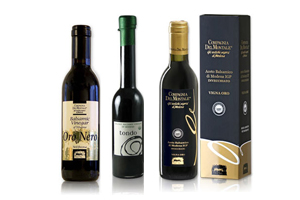How to Taste Balsamic Vinegar Like an Expert
Just like truffle oil, the market is stuffed with balsamic vinegar options and a trip to the grocery store can be overwhelming. How do you know whether what you’ve bought is worth what you paid for it?
Here are some tips from experts to help you tell the difference.
Ingredient Lists are Powerful Clues
The ingredient list can be a very helpful clue. Quality vinegar producers do not use caramel coloring, artificial thickeners, etc. If you see anything on the ingredient list besides “grape must” “red wine vinegar” and maybe “sulfites”, put the bottle right back on the shelf.
What About Age?
We provide ages for our vinegars in our vinegar guide.
What to Taste & Look For
The longer a balsamic has been aged, the less tart it is likely to be (they should all have an acidity of 6%, but the acid’s effect should be less pronounced as the vinegar concentrates).
Affinato & Extra Vecchio Balsamic Vinegars Will Always Be Good


